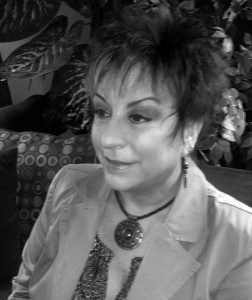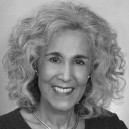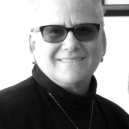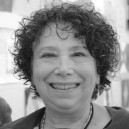Robynn Barg
Community Mental Health Social Worker
Robynn Barg, LCSW, understood that working as a community mental health counselor would be intense, exhausting, and stressful. She also knew, based on extensive internship experience in the field, that working with the chronically and seriously ill was also both fascinating and incredibly rewarding. She describes her employment simply, by saying "it's not for sissies", and her long career in the field clearly indicates that she is no sissy. She is also quite knowledgeable, which comes from working multiple internships in an in-patient clinic and a psycho-social rehabilitation program and then as a professional residential clinician and outpatient clinician. Her wealth of knowledge and experience gives her plenty to talk about and luckily she was willing to talk about all of it with us. Enjoy!
Can you tell us about how you ended up becoming a Community Mental Health Social Worker?
When I decided that I wanted to go into social work (this was not my first choice- I had a previous master degree), I knew I wanted to work with ‘the underdogs’- people who didn't fit in society well. I felt, and still do, that the seriously mentally ill were those folks. I had done both of my internships in my masters program (at Jane Addams Coll. Of Social Work) with this population, and found them fascinating and challenging. I've always liked a good challenge. The Dupage Co. Health Dept. had a really good reputation in this area (western suburbs of Chicago) as a cutting edge agency, so I wanted to work with them. I started out as a part-time crisis worker, which I didn't love, but it got me ‘in the door’, and shortly afterwards a position in one of the residential programs opened up, and I applied for that, and got it.
What sort of education and experience did you have to acquire to be eligible for this position?
My degree is an MSW. And as I said, I did 2 internships, one in a psycho-social rehab, program, and the second on an inpatient psych. Unit, so I had a good foundation and a fair amount of experience working with this population. I stayed in this job for about 4 years, then left and worked for a grant project- also with this population, but with a focus on families. When the grant folded, I went back to the health dept, as an outpatient clinician, and stayed in that position until Dec. 2011.
What exactly did your job entail? What is the 9-5 of a community mental health social worker?
First of all, these aren't 9-5 jobs…As a residential clinician, I worked on Saturdays so I was available to provide support during the weekends. I also had to respond to any crisis situations whenever they happened. As an outpatient clinician, I worked 2 evenings per week, and when I took on supervisory tasks, I had to be available 24/7 to provide backup for my staff.
What is it that you loved about your job?
Again, as I said, this is a very challenging population. I found this work very rewarding, as I felt that I could potentially help these folks to improve their quality of life. Working with the health dept. allowed me do a variety of activities, so I didn't just see clients. I was able to do some program development, as well as implement new programs, and provide supervision to both MSW students and staff, all of which was very fulfilling. In short- I was never bored! I also had the wonderful opportunity to work with many great people, several of whom became close friends, and they are still part of my life.
What are the most difficult aspects of working as a community mental health social worker?
Because this population is seriously and chronically ill, working with them is extremely intense and stressful. I never knew what might happen on a given day…we used to talk about the ‘crisis du jour’…cause there always seemed to be one. It seemed that somebody was always becoming more symptomatic, which could mean they were suicidal, abusing substances, or acting out in some bizarre and harmful way, that demanded immediate response.
Aside from the stresses of the direct clinical work, there were also ongoing stresses of working in an agency that was in the public sector, which meant that we were always subject to whatever the current politics in the county and state were dictating…and needless to say, they changed constantly. Over the years I worked in this agency, we went from being primarily grant and program funded, to ‘fee for service’, which was a huge shift. Also we went from being paper based to electronic records. (If you know anything about human service people, we tend to be very technology phobic…so this was enormous!) And every time the political climate changed, so did our focus, and that included Medicare, Medicaid, private insurance, credentialing organizations, you name it…we had many, many bosses dictating what we did and how we did it…(good times) A few year ago we started using a horrible computer program called “Avatar” that was so difficult for me to learn, I actually thought I might have to leave the agency…I finally learned it, but it was an excruciating process. And then of course, the powers that be finally realized how horrible it was,,,after 2+ years of losing money, and dumped it. Then we had to learn a whole new program…more fun.
Can you share with us an experience you have had as a community mental health social worker in which you felt your skill set made a difference in someone's life?
I’m glad to say, I can think of quite a few. I think one of the most important ‘skills’ necessary in this work is patience. This is not a population that can make big changes very quickly, so it’s necessary to repeat things frequently, and be aware of really small incremental progress. Also flexibility and being available to provide a huge amount of support are essential. These are people who often start with no confidence in themselves and part of my job was to provide what we call a ‘holding environment’- we want to provide them with the confidence they don’t have, sort of like a surrogate, and just keep doing that until they’re able to internalize that belief in themselves. I’m happy to say I watched many clients achieve this, and successfully leave treatment. This was sometimes people leaving residential programs to live independently in the community, or perhaps be able to maintain a job for the first time in their lives and become more self supporting, or maybe just be able to leave the house and go to the supermarket by themselves.
In your opinion, what are attributes that students should cultivate in order to become GREAT Social Workers in the mental health field?
I think I've mentioned a few of them already, however a solid understanding of psycho-pathology, which means a good familiarity with the DSM ( the Diagnostic and Statistical Manual) is essential. Basic social work/ therapy skills are a must. Good listening skills, a lot of empathy, a non judgmental attitude, and perhaps most importantly, the ability to leave work at work! People who tend to allow their concern for clients to bleed into their off-work time, also tend to burn out pretty quickly. The ability to maintain a critical distance in this work is imperative. And like I said before…patience, patience, patience…..
Do you have any final words of wisdom for individuals looking to work in community health?
It’s not for sissy’s…people who want to make a lot of money don’t belong there, cause there isn't any. This is work for people who are committed to the field, and are fulfilled and rewarded with non-tangibles.
I've heard it said that you have to be a little crazy to do this kind of work, and it’s probably true…but I think ‘crazy’ in the best possible way.



























